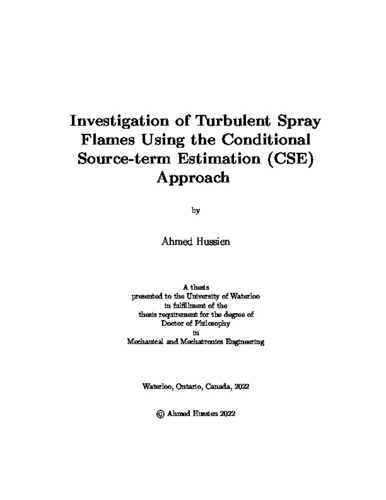| dc.contributor.author | Hussien, Ahmed Ali Mahmoud | |
| dc.date.accessioned | 2022-05-16 19:32:08 (GMT) | |
| dc.date.available | 2022-05-16 19:32:08 (GMT) | |
| dc.date.issued | 2022-05-16 | |
| dc.date.submitted | 2022-05-11 | |
| dc.identifier.uri | http://hdl.handle.net/10012/18280 | |
| dc.description.abstract | Conditional Source-term Estimation (CSE) is a turbulent combustion model for gaseous combustion. This work aims at extending the CSE formulation to address turbulent spray combustion. The Eulerian-Lagrangian method is implemented where the Eulerian and Lagrangian methods are used to describe the gas and liquid phases, respectively. Two-way coupling is implemented where the mutual effects of the gas and liquid phases are accounted for. Reynolds-Averaged Navier-Stokes (RANS) and Large Eddy Simulation (LES) equations for gas combustion are solved along with the Lagrangian equations to determine the liquid phase source terms. The mass, momentum, enthalpy, and species equations are solved with adequate closures for the unclosed terms. Detailed chemistry mechanisms are included by tabulating the reaction rates and mass fractions prior to the simulations.
To assess the Lagrangian spray model, RANS equations are solved to investigate a turbulent non-reacting acetone spray. The gas velocity and spray statistics show good agreement with the experimental data. In CSE, the mixture fraction is used as a conditioning variable to study non-premixed combustion. CSE is implemented to simulate a series of turbulent non-premixed acetone spray flames. The results reveal generally good agreement for the gas and spray compared to the experiments with noticeable discrepancies at some locations. The sources of discrepancy include inaccurate turbulent mixing field, increased level of premixing for some flames, and the neglect of spray effect in the chemistry tabulation. Doubly CSE (DCSE) is implemented by introducing the progress variable as a second conditioning variable to simulate partially premixed ethanol spray flames. Unlike previous DCSE implementations, a non-normalized progress variable representation is used to eliminate modeling difficulties related to the normalized form. The comparison between CSE and DCSE shows improved DCSE predictions at most locations.
The effects of enthalpy losses due to evaporation and gas radiation are included in the chemistry tabulation by introducing a fourth dimension to the chemistry library. Further, LES is performed to obtain more accurate mixing fields to study turbulent ethanol flames close to the blow-off limit. In general, LES improves the predictions compared to RANS simulation. In addition, adding the enthalpy losses enhances the temperature predictions, particularly for the flames with high jet velocities.
In conclusion, this study proves the capability of CSE/DCSE in accurately predicting the gas and spray statistics. Future work may address more complex fuels, swirl spray, combustion in higher pressures, and more accurate spray models. | en |
| dc.language.iso | en | en |
| dc.publisher | University of Waterloo | en |
| dc.subject | combustion | en |
| dc.subject | turbulence | en |
| dc.subject | CFD | en |
| dc.subject | spray | en |
| dc.subject | CSE | en |
| dc.subject | DCSE | en |
| dc.subject | flame | en |
| dc.title | Investigation of Turbulent Spray Flames Using the Conditional Source-term Estimation (CSE) Approach | en |
| dc.type | Doctoral Thesis | en |
| dc.pending | false | |
| uws-etd.degree.department | Mechanical and Mechatronics Engineering | en |
| uws-etd.degree.discipline | Mechanical Engineering | en |
| uws-etd.degree.grantor | University of Waterloo | en |
| uws-etd.degree | Doctor of Philosophy | en |
| uws-etd.embargo.terms | 0 | en |
| uws.contributor.advisor | Devaud, Cecile | |
| uws.contributor.affiliation1 | Faculty of Engineering | en |
| uws.published.city | Waterloo | en |
| uws.published.country | Canada | en |
| uws.published.province | Ontario | en |
| uws.typeOfResource | Text | en |
| uws.peerReviewStatus | Unreviewed | en |
| uws.scholarLevel | Graduate | en |

